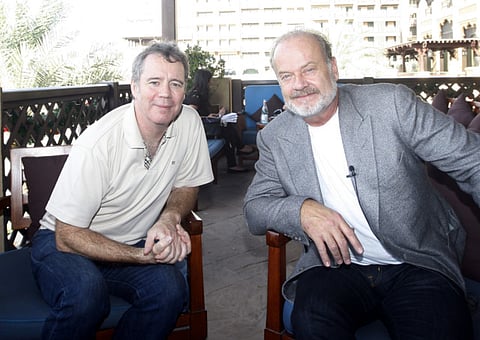Kelsey Grammer goes beyond ‘Frasier’ at Diff
Actor was at the festival for the world premiere of his film ‘Breaking the Bank’

A few minutes before my interview with Kelsey Grammer on Tuesday afternoon — he was attending the Dubai International Film Festival for the world premiere of his latest film, Breaking the Bank, later that night — he was stopped by an excitable table full of young adults having lunch. They wanted to say hello and possibly get a photo, and Grammer, the image of business casual in a blazer-jeans-sneakers combo, was more than happy to oblige. The table gave him a round of applause as he approached, then thanked him profusely for making their day.
It’s safe to assume that they know him best as Frasier Crane, the self-important psychiatrist who knew it all. Dr Crane, making his first appearance on the sitcom Cheers in 1984, and going on to have his very own show for 11 seasons, was the definitive character that brought Grammer everlasting worldwide attention and four Emmy Award wins.
“I wasn’t sure that Frasier was going to go that distance, but he took me to some lovely places. What was fun about playing him was that he could do anything, honestly. You could write anything for him to play, and it was fun to watch him just sort of dive into it,” said Grammer.
“I know I speak of him as being something outside of myself, which he is — we don’t really relate on a lot of levels.”
Since then, Grammer has put an adequate amount of distance between himself and Crane. He has taken on more than 30 projects since 2004, with the latest big name production being Transformers 4, which sees him play a villain.
“Transformers 4 was great fun — just great fun. We did a show called Boss a few years ago that got a lot of attention — pretty much broke the mould of Frasier. We got past that at that point. Now he’s just a part of my memory — and an ongoing pleasant memory for a lot of viewers,” said Grammer.
The 59-year-old actor was right at home in Breaking the Bank, a comedy that centres around a 200-year-old private bank, Tuftons, which all but collapses under the cringe-worthy guidance of Grammer’s bumbling, clueless and absolutely inept character, Charles Bunbury. Bunbury, chairman of the bank thanks to a decision made by his begrudging father-in-the-law, is so exaggeratedly incompetent that it’s hard to believe he could exist in the real world.
Director Vadim Jean, who worked with Grammer once before, said he was aiming to make a quintessential British comedy that calls on the Ealing Comedies of the 1940s and ’50s. The cast of characters include Bunbury’s stereotypical crazy wife, Penelope, who smashes his belongings with a golf club and thinks he’s the cause of all her troubles. Their anti-capitalist daughter, Annabel, who lives in a dive and eats scoured foods with her shaggy-haired boyfriend Twig. The diabolical trader Nick and his snake-like American accomplice, Richard. The overlooked smart guy, the enlightened homeless man, the dog named Taxi.
Despite a splattering of witty, laugh-out-loud dialogue here and there, however, the film was one banana slip away from being classified as slapstick.
“I think of one of the old British private banks — and I’ve got a few friends who are bankers — who said, ‘No, it was people like Charles Bunbury, the character that Kelsey plays, that brought down that bank.’ [The characters] are obviously heightened, because it’s a comedy and you want them to be kind of large and cinematic in that way,” said Jean.
Grammer seemed to agree. “It’s interesting you said that some of the characters are too exaggerated or it’s hard to believe they exist — I know all these people,” he said.
He and Jean worked out a code word in case he slipped too far out of himself during his own performance: Cary Grant.
“Cary Grant did so many comedic performances and actually got so big at times, but he always seemed to stay within himself a little bit. So I said, ‘If I go too much, just say Carey Grant to me’,” explained Grammer.
One aspect of his role that came surprisingly naturally to Grammer was the British accent. Jean called the actor “too humble” about his versatility, and shared the story of how he needlessly hired one of the best dialogue coaches in the UK to help him learn his way around the dialect, only to dismiss him moments later.
“Within three minutes of the read through, I went through to production and said, ‘You can send him away.’ We sent the dialogue coach home — we didn’t need one,” said Jean.
Grammer laughed. “I think he was a bit miffed. He actually said, ‘Well, good luck!’ Sorry,” he added.
The film has yet to score a distribution deal, but Jean and Grammer are hopeful about their prospects.
“The screening tonight in Dubai at the film festival is the world premiere. And literally at the same time in London the film is being screened for the very first time to any distributors, so it’s kind of a momentous couple of hours. And then we’ll find out,” he said.



